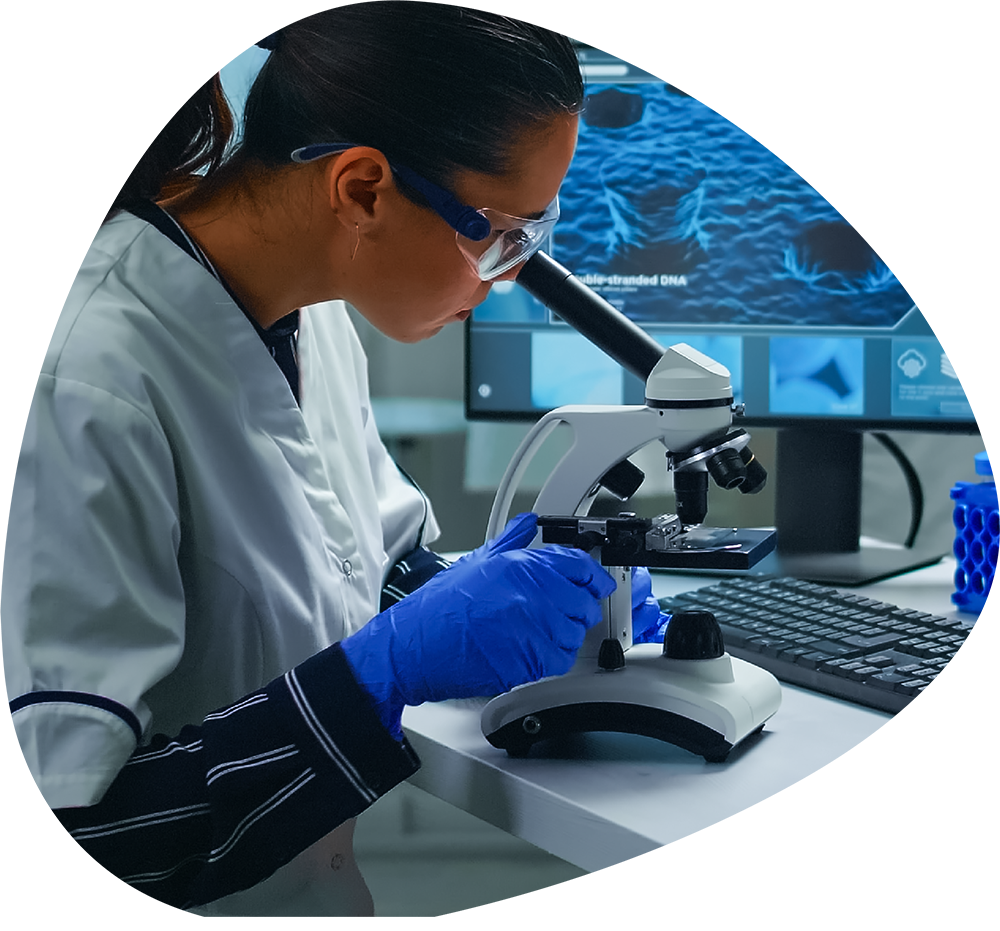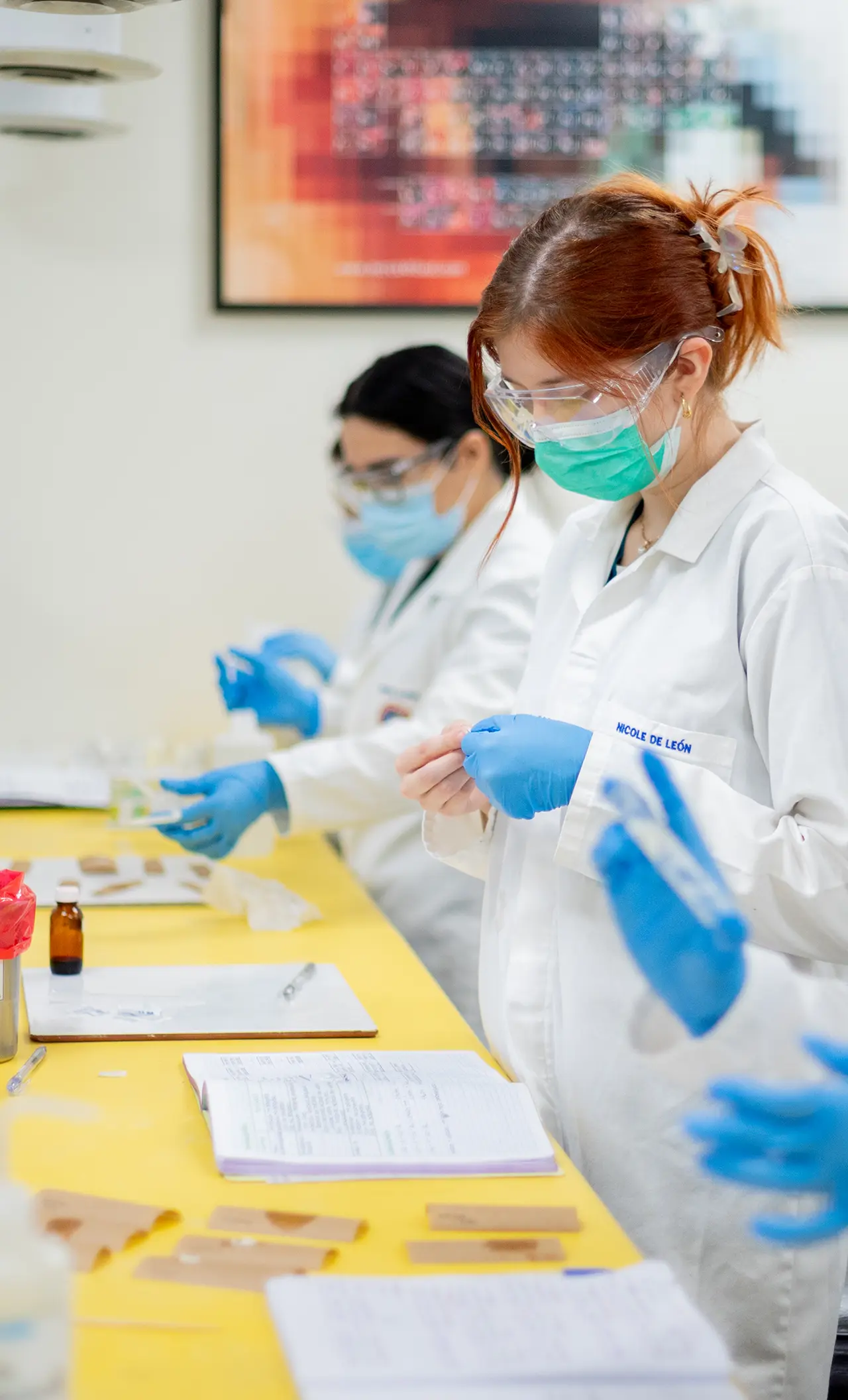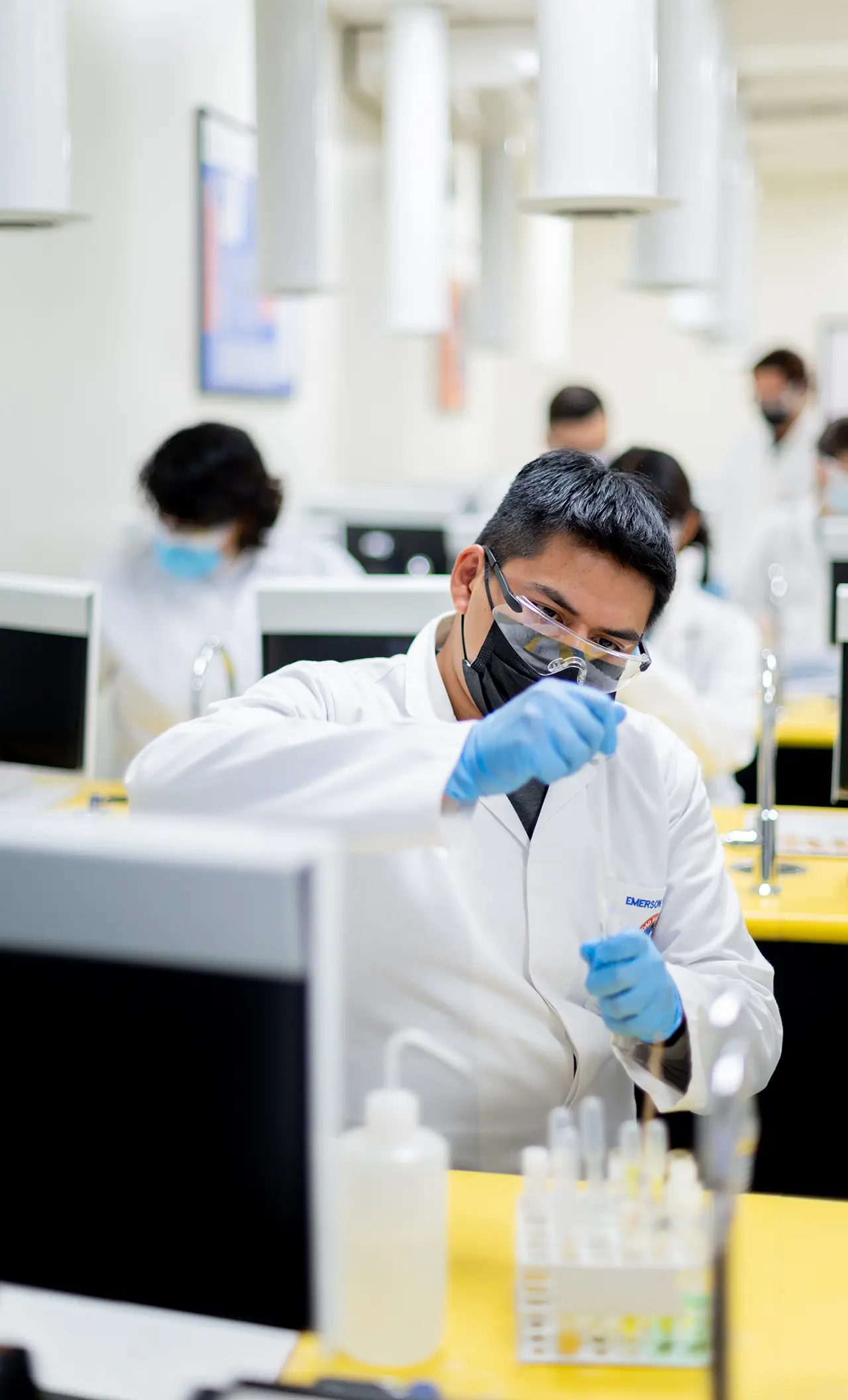
- Bachelor's Degree in
- Clinical Biochemistry
- Degree to be obtained
- Degree in Clinical Biochemistry
- Academic degree
- Bachelor's Degree
- Duration
- 5 years and a half
- Modality
- In-person
- Schedule:
- Daily Morning
- Career description
-
The graduates in Biochemistry, in addition to handling clinical laboratory science techniques, must show great competence in the use of diagnostic techniques based on genetics. The knowledge acquired during their studies enables them to work in public and private health institutions where they will be able to perform functions in the care area as well as in administration, teaching and research. They will be able to undertake postgraduate studies and majors in related areas. All this within a framework characterized by active quality management and professional ethics based on universal human values.
- What will you learn during the program?
-
Students on the Bachelor's Degree in Biological Chemistry will learn to:
1. Perform in a technical and professional manner, the clinical, biochemical, microbiological, immunological, genetic and molecular analyses that may be required in the exercise of their profession.
2. Assume the management, leadership, consultancy and development of clinical and molecular laboratory services within the field of health, ensuring that the services under his/her responsibility meet the demands and requirements of the highest quality.
3. Hold management positions in research projects related to their professional field that contribute to resolving the need for new diagnostic methodologies required for individual and social well-being.
4. Hold positions in the context of higher education, providing new knowledge to future generations of scientists in the biosciences field.
Gallery
AdmissionProfile
Students enrolling in the Biochemistry program at the Mariano Gálvez University must have basic knowledge of mathematics, physics, chemistry, biology, and language, as well as mastery of basic computer equipment and programs (word processing, spreadsheets, presentations, internet). In addition, they must have successfully completed secondary education, preferably with a scientific orientation. During the career, students must have the ability to read and understand scientific texts, good writing skills, the ability to analyze and synthesize, the ability to apply appropriate study techniques, the ability to systematize knowledge, the ability to work in a team, and full-time dedication to their studies and internships. As part of the student body of the Mariano Gálvez University, each student must abide by the University's regulations, taking care of their ethical, moral, and social behavior.
Graduate'sProfile
Upon completing the degree requirements of the Degree in Biochemistry program, the graduates, with a Bachelor's degree, will be able to:
1. Perform in a technical, professional manner and with the highest sense of quality, the clinical, biochemical, microbiological, immunological, molecular, and genetic analysis services are under their responsibility.
2. Organizing, directing and executing activities of clinical analysis laboratories.
3. Solving problems in the areas of clinical diagnosis, molecular biology and genetics.
4. Assume the management, leadership and consultancy of the aforementioned services, within the field of health, ensuring that the services under their responsibility are adequate and comply with the strictest quality standards and requirements.
5. To hold positions in the management of research projects related to their professional field and which contribute to solving social and national problems.
6. To undertake postgraduate studies in related areas.
Career Opportunities

Hospital clinical laboratories. Private clinical laboratories. Public and private blood banks. Breast milk banks. Forensic research. Molecular research. Industrial microbiology.
Curriculum
| 1° Ciclo | ANATOMIA HUMANA I | BIOLOGIA GENERAL | DESARROLLO HUMANO Y PROFESIONAL | MATEMÁTICA APLICADA | METODOLOGIA DE INVESTIGACIÓN | QUIMICA INORGANICA I | |
|---|---|---|---|---|---|---|---|
| 2° Ciclo | ANATOMIA HUMANA II | BIOLOGIA GENERAL II | CALCULO DIFERENCIAL E INTEGRAL | FISICA I | QUIMICA INORGANICA II | REDACCION TECNICA | |
| 3° Ciclo | ANÁLISIS QUIMICO I | BIOLOGIA CELULAR | CALCULO AVANZADO | FISICA II | FISIOLOGIA HUMANA I | QUIMICA ORGANICA I | |
| 4° Ciclo | ANÁLISIS QUIMICO II | BIOESTADISTICA | FISIOLOGIA HUMANA II | GENETICA | MICROBIOLOGIA GENERAL | QUIMICA ORGANICA II | SOCIOLOGÍA |
| 5° Ciclo | ANÁLISIS INSTRUMENTAL I | BACTERIOLOGIA I | BIOQUIMICA I | FISICOQUIMICA | FISIOPATOLOGIA I | PARASITOLOGIA | |
| 6° Ciclo | ANÁLISIS INSTRUMENTAL II | BACTERIOLOGIA II | BIOQUIMICA II | EPIDEMIOLOGIA | FISIOPATOLOGIA II | HEMATOLOGIA | |
| 7° Ciclo | BIOLOGIA MOLECULAR | BIOQUIMICA CLINICA I | CITOHISTOLOGIA | INMUNOLOGIA | MICOLOGIA | VIROLOGIA | |
| 8° Ciclo | BANCO DE SANGRE | BIOINFORMATICA | BIOQUIMICA CLINICA II | ELABORACIÓN Y EVALUACIÓN DE PROYECTOS DE INVESTIGACIÓN | INMUNOPATOLOGIA | MICROBIOLOGIA APLICADA | TECNOLOGIA BIOMOLECULAR I |
| 9° Ciclo | ADMINISTRACIÓN Y MERCADEO CLINICO | BIOETICA | CORRELACION CLINICA PARA EL DIAGNOSTICO | FARMACOLOGIA | GESTIÓN DE CALIDAD | TECNOLOGIA BIOMOLECULAR II | TRABAJO DE GRADUACIÓN I |
| 10° Ciclo | PRACTICA SUPERVISADA | TRABAJO DE GRADUACIÓN II | |||||
| 11° Ciclo | PRACTICA PROFESIONAL |


